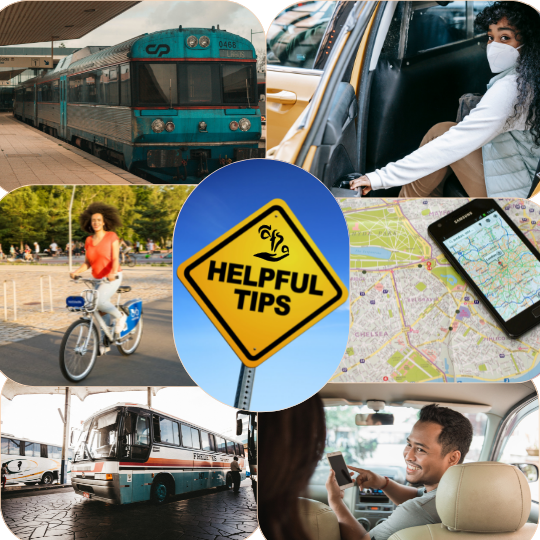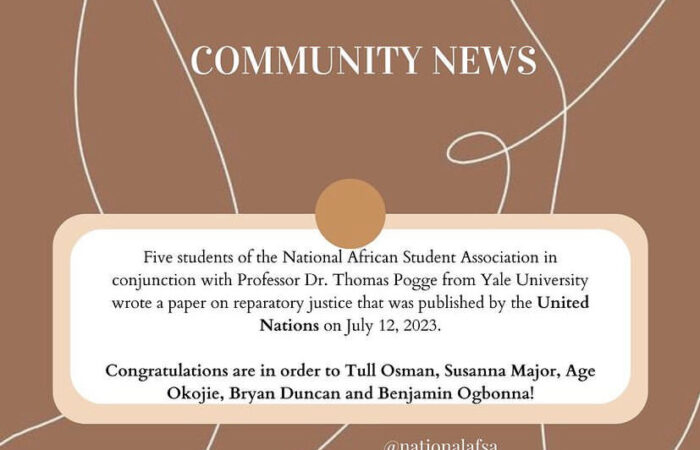By Erin Lynn – National African Student Association, Inc.

Learning how to get around in the United States!
Many of the major cities have bicycles that you can use for a small fee. This can be a convenient way to get around without getting stuck as easily in city traffic. For your safety, though, it is important to understand some very basic bicycling rules and city laws. A basic list of rules can be found here: Biking Rules. Also, if you use city bikes, make sure you are aware of their terms and conditions. Otherwise, those small fees can become expensive mistakes. Be sure to wear a helmet!
Sometimes, the easiest way to get around is by bus. Buses generally run on a set schedule and will make stops at or near most of the major neighborhoods. Some city buses offer multi-trip passes at a reduced rate, too, so you may be able to get unlimited rides on a monthly pass. A couple of warnings about buses, though: Buses can be pretty crowded, so you may have to stand; and buses are like big cars, so they can get stuck in traffic and they can break down. You may need to give yourself more time, just in case. One last thing – Check for student discounts or free access with your student ID!
If you are in a city with trains or subways, you may find this is the quickest and most convenient way to get around. Like the bus, trains and subways run on a set schedule and can take you from one side of a city to the other without interference from street traffic. Also like the bus, monthly passes are often available and may be available at a discount for students. Some of the same warnings apply; you may have to stand, and they can break down, so give yourself the extra time you need.
You may prefer to have your own car, so you can get around easily and at your convenience. But having your own car can be expensive! Even if you don’t have a car payment, you still have to pay for insurance, gas, repairs, and, in some cities and schools, parking. If you would rather have a temporary option to travel outside of the city, look for options to rent a car, but be aware that you may have additional requirements as an international student. More information about that can be found here: Renting a Car. You can also use taxis or rideshare platforms like Uber, Lyft, or Grab to get around within the city. There are pros and cons to getting around this way, many of which you can find here: Uber vs. Lyft
If at all possible, carpool! As you get to know your classmates, roommates, and neighbors, you may discover someone nearby is driving back and forth to campus each day. If so, that may be another option for some or all of those trips. It’s not uncommon for riders to offer money to help with gas or just as a “thanks” for the convenience, and it can be a lot more fun than riding the bus.
If you are able and the distance is reasonable, walk. Walking is the cheapest way to get around and also allows for a little bit of exercise each day. Walking is not without risk, though, especially at certain times of the day or in certain areas of the city. Please look at these suggestions from Tufts University about pedestrian safety: Walk Smart
In some cities, you may find ferries (or boat taxis), streetcars/cable cars/trolleys, or other types of rail systems (e.g. trams, light rail, etc.), all of which can be convenient options to explore, especially in warmer months and on dryer days.
Last but not least, if you have a smart phone, Google Maps and city-specific transportation apps are your friend. Use these resources BEFORE you get ready to go someplace, so you’ll look less like a tourist and will be less vulnerable in your surroundings. I will even write or print my route out and check it cautiously before and during the ride, so I don’t forget. Transportation, especially in big cities, can be confusing and may leave you feeling lost, so travel smartly and safely!
TRANSPORTATION SAFETY TIPS
- International drivers are at an increased risk for traffic accidents. If you plan to drive, make sure you are aware of the driving rules within the United States.
- Always be alert and aware of your surroundings. Playing on your cellphone, reading a book, or walking around with headphones can distract you from cars, bike riders, animals, and people who may try to take advantage of you.
- If possible, don’t walk alone at night. Either walk with a friend or, if your campus has an escort service, ask for a ride.
- Keep local and campus emergency phone numbers programmed into your phone.
- Unless absolutely necessary, don’t carry a lot of cash in your wallet or in your pockets. If you need a significant amount of cash, tuck it safely into your shoe or into some other part of your clothing that is less accessible. Also, tuck necklaces inside your clothing and turn rings around so that valuable stones aren’t showing, or simply remove all jewelry before using public transportation.
- Never drive or get into a car with someone if you or they have been drinking alcohol or are otherwise impaired.
- Never leave your personal items alone on public transportation or at the stations. For example, if you set a purse or laptop on a bench and walk away for a moment to a nearby trash can, someone may take it.
- When using the bus or calling for a taxi or Uber/Lyft, use a stop that’s well lit and near a coffee shop or store that’s open.
- Don’t fall asleep on the bus, subway, or any other form of public transportation. Not only do you risk missing your stop, you might risk losing your wallet.
- Sit near the bus driver.
- Have your money or tokens in hand to give to the driver. This way you won’t fumble with your wallet or purse.
- Don’t engage in unnecessary conversation with strangers. Never give out any personal information. The person you’re talking to may be fine, but others can overhear.
- Don’t share a cab with a stranger.
- Sit near the aisle so you can get up quickly if someone bothers you.
Don’t sit near the exit door on busses, trains or subways. At stops, when the door opens, someone can reach in and snatch your purse or briefcase.


